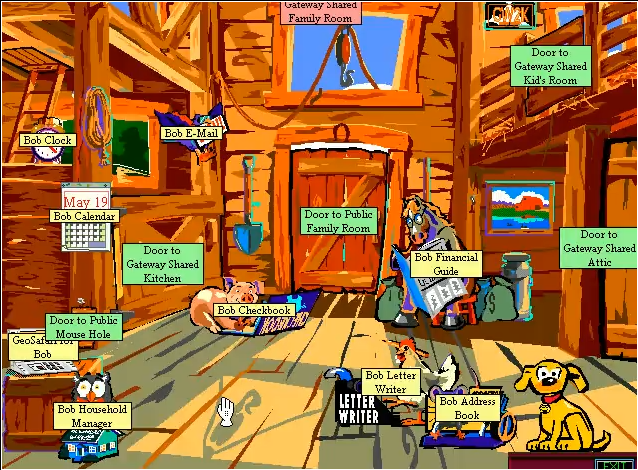
Stock market decimalization kills IPOs and ruins the economy
Second in a series. Well it took me more than the one day I predicted to finish this column, which purports to explain that dull feeling so many of us have in our hearts these days when we consider the US economy. Our entrepreneurial zeal is to some extent zapped. For a decade it seemed we needed to jump from bubble to bubble in order just to drive economic growth -- growth that ultimately didn’t last. What happened? Initial Public Offerings (IPOs) went away, that’s what happened.
I wrote several columns on job creation over the last year, columns that explained in great detail how new businesses, young businesses, and small businesses create jobs and big businesses destroy them. Big business grows by economies of scale, economies of scale are gained by increasing efficiency, and increased efficiency in big business always -- always -- means creating more economic output with fewer people.

The Great Recession isn’t really over
First in a series. A couple of years ago, in an obvious moment of poor judgement, the Kauffman Foundation placed my personal rag on its list of the top 50 economics blogs in America. So from time to time I feel compelled to write about economic issues and the US Labor Day holiday provides a good excuse for doing so now. In a sense you could say I inherited this gig because my parents began their careers in the 1940s working for the US Bureau of Labor Statistics. This first of two columns looks at employment numbers in the current recovery while the second will try to explain why the economy has been so resistant to recovery and what can be done about it.
You’ll see many news stories in the next few days based on a study from the National Employment Law Project detailing how many and what kinds of jobs were lost in the Great Recession and what kinds have come back in the current recovery. Cutting to the chase we lost eight million jobs, have recovered four million of those, but, here’s the problem, the recovered jobs on average pay a lot less than did the jobs that were lost, which is why the US middle class is still hurting.

Windows 8 suffers from the Microsoft Bob effect
Windows 8 is just over a month from hitting the market and my sense is that this initial release, at least, will be at best controversial and at worst a failure. Microsoft is simply trying to change too many things at once.
What we have here is the Microsoft Bob effect, where change runs amuck simply because it can, compounded in this case by a sense of panic in Redmond, Wash. Microsoft so desperately needs Windows 8 to be a huge success that they’ve fiddled it into a likely failure.

WeJITS is collaboration in a persistent link
Third in a series. Every few years something comes along to fundamentally change how we use the World Wide Web, whether it is online video, social networking, dynamic pages or even search, itself. Last week a new technology called WeJIT was announced that looks like something small but is really something big because it extends collaboration from specialized sites like wikis to everywhere HTML is used. WeJITS is collaboration in a persistent link.
WeJITS come from Democrasoft, a company here Santa Rosa, Calif. that is best known for Collaborize Classroom, a cloud-based service used by more than 30,000 teachers to interact with students, deliver lessons from a global peer reviewed library and even give tests. WeJITS take the best of Collaborize Classroom and place it in a single link.

JavaScript Video is your density, I mean, Destiny
Second in a series. Three quarters of the bits being schlepped over the Internet today are video bits, so video standards are more important than ever. To accommodate this huge load of video data we’ve developed compression technologies, special protocols like the Real Time Streaming Protocol (RTSP), we’ve pushed data to the edge of the network with Content Distribution Networks (originally Akamai but now many others).
All these Internet video technologies are in transition, too, with H.264 and HTML5 video in the ascendence while stalwarts like RealVideo and even Flash Video appear to be in decline. The latter is most significant because Adobe’s Flash has been -- thanks to YouTube -- the most ubiquitous video standard. Flash video was everywhere. But with Flash apparently leaving the ever-growing mobile space, will we ever see another truly ubiquitous web video standard? We already have and it is called ClipStream G2 JavaScript video.

Designing a better electric plane
First in a series. One thing about mature markets is they spawn opportunity through pure complexity. What does the press do but sit around discussing the size and depth and pimples on the bum of mature markets? But we spend so much time discussing the implications of what has already happened that we don’t give much space to what’s coming in the form of new ideas. So for the next week or so I’ll be doing a series of columns about new ideas, especially new technologies, that ought to interest us all.
Leading by example I’ll start with a project my kids and I have been working on this summer -- an electric airplane.

Click fraudster eliminates bots, sends advertisers bogus bills
While click fraud and identity theft are probably the most common forms of larceny on the Internet, I just heard of a company that sets a whole new standard of bad, lying to advertisers about, well, everything.
Click fraud is when a website either clicks on its own ads to increase revenue, gets someone else to click on them with no intention of buying or works with botnets to generate millions of illegal clicks. I wrote a few months ago how longtime YouTubers were suffering income drops as Google algorithmically eliminated their botnet clicks. But click fraud requires a third-party ad network to work. What I am writing about here is something completely different.

If it rains, is your data safe in the cloud?
This is a followup to my recent column about Steve Wozniak’s warning on the perils of cloud computing, especially cloud storage. It might surprise many users to know there are firms that sell cloud storage and do not back it up. They rely on the disk RAID and some redundancy in the cloud to “protect” your data. If something happens to their datacenter, they could probably not recover your data.
Remember MailandNews.com? They did not have a viable business model. They also didn’t back up their servers. One day they had a big crash and relied on the RAID array to recover the data. It took two weeks and still not all of the data was recovered.

Steve Wozniak is right -- users are going to eventually be burned if they rely solely on cloud backup
Apple co-founder Steve Wozniak this week warned of the perils of depending too much on cloud storage and the general press reacted like this was: A) news, and; B) evidence of some inherent failure in cloud architecture. In fact it is not news (Woz never claimed it was) and mainly represents something we used to call “common sense”.
However secure you think your cloud storage is, why solely rely on it when keeping an extra backup can cost from very little to nothing at all?

Apple is not smart, Samsung is the Borg
I was supposed to be on CNN on Monday night to comment on the Apple v. Samsung patent infringement trial that just started in San Jose, Calif., but then presidential candidate Mitt Romney insulted the Palestinians and I was bumped. The way these things work is CNN calls the day before so I have time to think up something pithy to say. The question now is what to do with all that pith? So I’m dumping it on you. Consider this the long distance view of this legal battle in the context of what it really is -- brands at war.
As a practical matter, I think it is very unlikely that Apple can win based on its accusation of “slavish copying”. We have laws based around copyright and patents for that, and if patent or copyright had been broken, this would be an easier case. I suppose there may be laws that cover “slavish copying”, but my guess is that it is something hard to prove. Even if the products look similar, the internals are likely to be quite different, as is the OS.

If YouTube isn't the best place to watch the Olympic games, it should be
If you are living in Afghanistan, Bangladesh, Brunei, Bhutan, Cambodia, East Timor, India, Indonesia, Iran, Laos, Malaysia, Maldives, Mauritius, Mongolia, Myanmar, Nepal, Pakistan, Papua New Guinea, Singapore, Sri Lanka, Thailand, or Vietnam and want to watch the London Olympics today I’m told your only choice is YouTube. Ten events are available at any time through the International Olympic Committee (IOC) YouTube channel.
Of course 60 live channels are available in the USA through youtube.com/nbcolympics, but I think the international story is more compelling by far because it brings live competition to places where it was never available before.

The Internet was created to save money
Depending on who you are talking to there were several very different reasons why the Internet was created, whether it was military command and control (Curtis LeMay told me that), to create a new communication and commerce infrastructure (Al Gore), or simply to advance the science of digital communications (lots of people). But Bob Taylor says the Internet was created to money. And since Bob Taylor was, more than anyone, the guy who caused the Internet to be created, well, I’ll believe him.
Taylor, probably best known for building and managing the Computer Systems Laboratory at XEROX PARC from which emerged advances including Ethernet, laser printing, and SmallTalk, was before that the DARPA program manager who commissioned the ARPANet, predecessor to the Internet. Taylor was followed in that DARPA position by Larry Roberts, Bob Kahn, and Vint Cerf -- all huge names in Internet lore -- but someone had to pull the trigger and that someone was Bob Taylor, who was tired of buying mainframes for universities.

IBM’s Indian Global Delivery Centers are anti-education?
The theory of outsourcing and offshoring IT as it is practiced in the second decade of the 21st century comes down to combining two fundamental ideas: 1) that specialist firms, whether here or overseas, can provide quality IT services at lower cost by leveraging economies of scale, and; 2) that offshore labor markets can multiply that price advantage through labor arbitrage using cheaper yet just as talented foreign labor to supplant more expensive domestic workers who are in extremely short supply. While this may be true in the odd case, for the most part I believe it is a lie.
This lie is hurting both American workers and the ability of American enterprise to compete in global markets.

Marissa Mayer is not facing a Steve Jobs-type opportunity at Yahoo
I see an interesting trend among people emailing me to comment about Marissa Mayer: They see her hiring at Yahoo as some kind of trick by Google. Ms. Mayer is Google to the core, readers say, and she’s going to Yahoo simply as a commando to pick and choose future Google acquisitions.
No, she isn’t.

Marissa Mayer might achieve greater things in her career, just not at Yahoo
If Aaron Sorkin (The Social Network, The West Wing, Newsroom) wrote the story of Yahoo and he got to Marissa Mayer’s surprise entrance as Yahoo’s latest CEO, here’s how he would probably play it: the brilliant, tough, beautiful, charismatic engineer defies her Google glass ceiling and, through sheer vision and clever example, saves the pioneering Internet company. That’s how Sorkin would play it because he likes an underdog, loves smart, well-spoken people and revels in beautiful if slightly flawed characters and happy endings. But in this case Aaron Sorkin would be playing it wrong.
To be clear, were I in the position of Yahoo’s board I would probably have hired Marissa Mayer, too. On paper she’s nearly perfect (only CEO experience is missing) and the drama of her going from not even being on the list of candidates discussed to getting the big job is wonderful theater that will play well on Wall Street for weeks, maybe months. For once the Yahoo board seems to have been on the ball.

